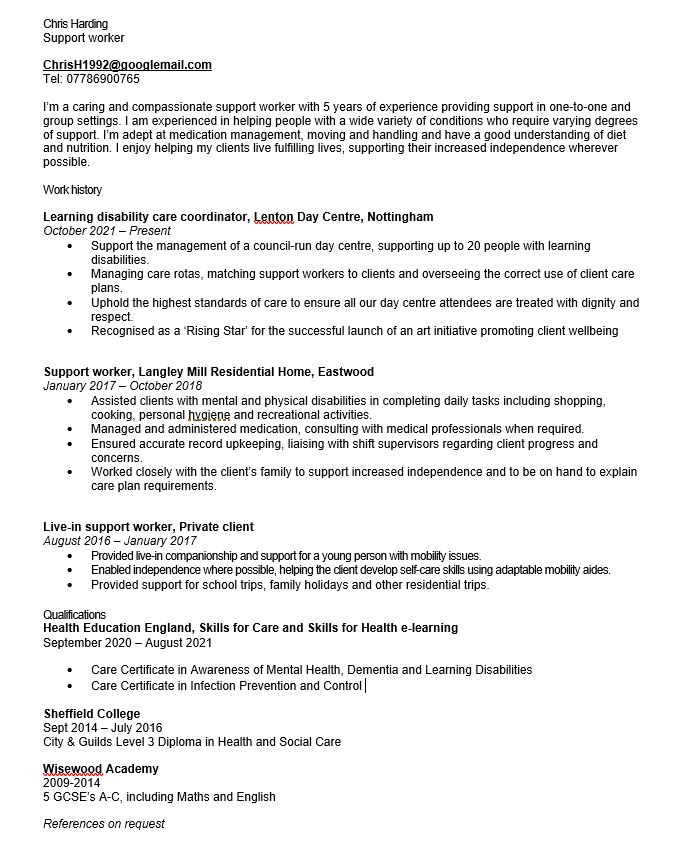 Support workers play an important role in caring for people who need help to live independent lives. Working as a support worker can be a hugely rewarding career, allowing you to make a positive difference to someone’s life every day.
Support workers play an important role in caring for people who need help to live independent lives. Working as a support worker can be a hugely rewarding career, allowing you to make a positive difference to someone’s life every day.
Whether you already have care experience or you’re just starting your career, a well-written support worker CV can demonstrate your passion and potential for helping vulnerable people to live fulfilling lives.
Within this guide, we will cover:
What to include in your support worker CV
Your support worker CV needs to show that you have what it takes to excel in the role, highlighting your personality, work experience and relevant qualifications.
Everyone is different, and so are our CVs. Whatever your experience and skills, take the time to ensure the person hiring for the position has all the information to make an informed decision about putting you forward for an interview. Within your CV, you need to include:
- Your name
- Your contact details, including telephone number and email address
- A short personal statement
- Your work history starting with your most recent position
- Details of the responsibilities you held
- Skills you have that apply to the role
- Education and qualifications
How to write a support worker CV
Writing or refreshing your support worker CV can be a daunting experience. Following a standard template will ensure you include all the information you need to make a great first impression.
1. Choose the best format and structure for your support worker CV
A well-formatted CV helps a future employer quickly pick out valuable information and your key qualities. To ensure your C.V. is clear and engaging for the potential employer, consider these key elements when formatting your C.V.
- Use the same style and font size throughout
- Highlight headers and key points with bold text
- Include adequate margins and spacing
- Use bullet points when detailing skills and experiences
Sticking to this format means the reader knows what to expect and where to look for the information they need.
2. Provide your contact details
Including your name and contact details is a must if you want the person recruiting for the support worker position to call you back. Make sure your name, telephone number and email address are marked at the top of the page so they can find your details quickly.
As we live in a digital world, there is some debate about including postal addresses on CVs. It is entirely up to you. If you think it would benefit the hirer to know that you are only a short commute away from the role, include these details.
3. Write a support worker personal statement for your CV
A personal statement sits at the top of your CV. It’s a short overview of your experience to date. After your name, it’s the first thing an employer will learn about you, providing them with a snapshot of your skills, experience and personality.
When writing a personal statement, try to keep it to 150 words. Be short and to the point. It should give a brief insight into who you are, what you can offer, and your career aims.
4. Add your work experience and career history
When writing your support worker CV, list your work experience starting with your current or most recent role. If you don’t have lots of work experience, include any paid part/full-time work, work experience placements, internships or volunteering. Even if you are at the beginning of your career, you will have transferrable skills that will be valuable to a prospective employer.
Here are the key work history things to include in your C.V.:
- The name of the employers
- Your job titles
- The dates you held the positions
It’s perfectly normal to have gaps in your employment. Life skills gained in these moments are often applicable and highly valued by employers.
5. Show off your support worker skills
Make a list of your qualities and experience that apply to the role. If you’re struggling with ideas, speak to someone who knows you well. Sometimes it’s easier for someone else to give you an objective view. You can also reference the skills and experience you have gained outside of traditional work settings, such as those you’ve gained volunteering or if you’ve cared for a family member.
Some skills required to be a good support worker include:
- Helping others, regardless of their condition
- Remaining calm under pressure and being able to deal with challenging situations
- Good communication - you’re comfortable speaking to all kinds of people
- You’re non-judgemental and can be supportive regardless of a person’s needs
- Empathy, with lots of patience and emotional resilience
- Understanding the need to speak clearly and sensitively to clients and their families
- Being a good listener and problem solver
Within your work history section, include bullet points detailing your responsibilities and achievements to demonstrate the skills and experiences you’ve gained so far.
- Have you been a dedicated support worker for a client? Detail the duties you performed for them.
- Have you had your performance celebrated by a local provider or internal employer recognition programme? Make sure you include it.
- Have your clients thrived in your care? Detail their progress.
These snippets build a picture of you as a professional, helping the hiring manager imagine you in the role. Within this section, also include phrases used in the job description. For example, if the job specification states that the company is looking for someone with experience in administering medication, and you have done this, include it as one of your bullet points.
6. Include an education section
List any qualifications you have, the dates you achieved them and the institutions where you got them from. Similar to your work history section, go in reverse chronological order, starting with your most recent qualifications.
This section is there to complement your career goals, so it may not be necessary to mention every subject and grade you got unless you’re recently out of education. As you gain more experience, you may want to reduce this to make space for your work history. For example, you might reference getting 5 GCSE’s A-C rather than noting every detail.
It’s beneficial to include any applicable qualifications, courses, or seminars you’ve attended. For example, if you have an NVQ/SVQ in Health & Social Care or have undertaken any care-related e-learning courses. This shows a future employer that you’re invested in a career as a support worker.
If you have other desirable skills, such as you speak another language, include them in your CV as this is a huge benefit to a future employer.
Support worker CV example

Final tips for your support worker CV
- Read your CV aloud. This will help you check for errors, ensure its tone is professional and has all the key information included.
- Remember, the person hiring you will have many CVs to review, so they are unlikely to read more than two pages. If you have lots to say, prioritise important information to avoid overloading the reader. You can always expand on your experience in the interview.
- A second pair of eyes will help you avoid typos and spelling mistakes. Turn to someone you trust or reach out to one of our experts resourcing recruiters at joinus@pulsenursingathome.co.uk. Our team sees hundreds of CVs daily, so they can give you best practice advice, increasing your chances of securing the support work role you want.
- Avoid including your marital status, date of birth, nationality, or photo. These are not relevant to your suitability for a support worker role.
- There’s no steadfast rule regarding the inclusion of reference details. Whether you write ‘References on request’ or include your referees’ contact details upfront may depend on whether your current employer knows you’re looking for a new job. Referees should be people who know you in a professional or educational setting.
Support worker jobs with Pulse Nursing at Home
Pulse Nursing at Home recruits and places compassionate support workers nationwide to deliver bespoke care to our paediatric and adult clients with complex conditions. We're always looking to grow our team of support workers to make a real difference in our clients' lives.
Our specialist team takes the time to get to know you, ensuring you're matched with clients who support your professional development and flexible working needs.
If you’re interested in our support worker opportunities, register your interest and explore the latest job opportunities here.
Got questions? Learn more about developing your support work career by speaking to one of our team